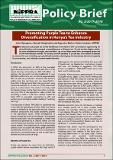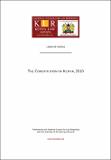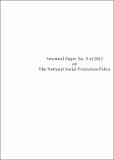Policy Brief No. 03 of 2017-2018 on Promoting Purple Tea to Enhance Diversification in Kenya's Tea Industry
| dc.date.accessioned | 2020-11-25T12:23:41Z | |
| dc.date.available | 2020-11-25T12:23:41Z | |
| dc.date.issued | 2017 | |
| dc.identifier.uri | http://repository.kippra.or.ke/handle/123456789/2298 | |
| dc.description.abstract | The discovery of clone TRFK 306/1 of purple tea was in line with the aspirations of Vision 2030 that Kenya needs to diversify its tea products and add value to enhance productivity and boost economic growth in the agricultural sector. While development of Kenya’s purple tea is still at the infancy, it is projected that its production has the potential to create new markets and generate up to US$ 60 million over the next 3-5 years and comprise up to 5% of Kenya’s tea export market. The production of a unique specialty product such as purple tea offers great promise in transforming Kenya’s tea industry and boosting the sub-sector’s competitiveness as well as earnings to farmers and the country at large. A recent study by KIPPRA identified capacity gaps in the tea value chain in general and specifically for the speciality teas. The gaps include insufficient numbers of tea specialists, statisticians, market researchers and policy experts. The gaps exist in institutions mandated to promote tea production, processing, marketing and research, among others... | en |
| dc.language.iso | en | en |
| dc.publisher | The Kenya Institute for Public Policy Research and Analysis (KIPPRA) | en |
| dc.relation.ispartofseries | PB/03/2017-2018; | |
| dc.subject | Purple Tea | en |
| dc.subject | Diversification | en |
| dc.subject | Kenya | en |
| dc.subject | Tea Industry | en |
| dc.title | Policy Brief No. 03 of 2017-2018 on Promoting Purple Tea to Enhance Diversification in Kenya's Tea Industry | en |
| dc.type | KIPPRA Publications | en |
| ppr.contributor.author | Kenya Institute for Public Policy Research and Analysis (KIPPRA) | en |
Files in this item
This item appears in the following Collection(s)
-
Policy Briefs [342]



